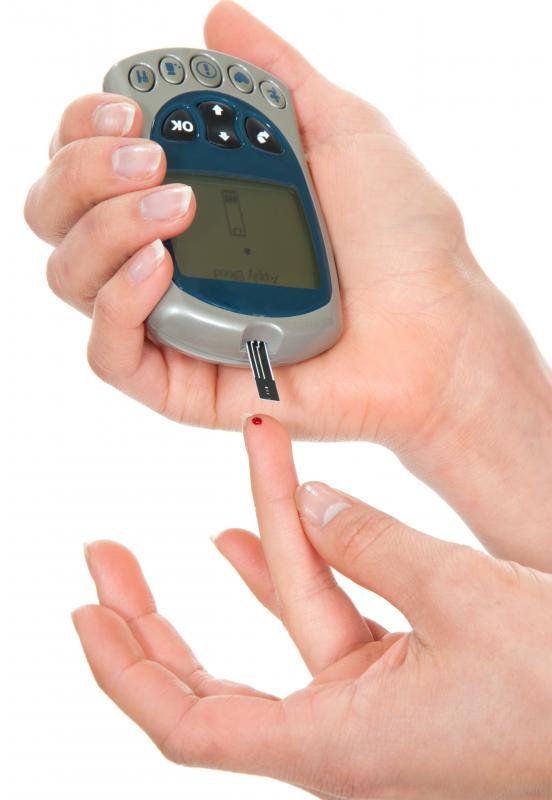At WiseGEEK, we're committed to delivering accurate, trustworthy information. Our expert-authored content is rigorously fact-checked and sourced from credible authorities. Discover how we uphold the highest standards in providing you with reliable knowledge.
What is Sugar Sensitivity?
Sugar sensitivity refers to a condition in which a person experiences wide fluctuations in blood sugar levels. These changes can cause many symptoms, including mood swings, weight gain, irritability, and drowsiness. Most types of sugar sensitivity can be treated through dietary changes and exercise.
Simple carbohydrates are found in foods made with refined sugars as well as in fruit. Complex carbohydrates are commonly called starches. These include breads, pasta, rice, and grains. Both types of carbohydrates affect blood sugar. Foods containing carbohydrates with whole grains and vitamins are healthier choices, and usually leave a person feeling more balanced since the sugars are metabolized over a longer period of time.

When carbohydrate-rich foods are consumed, normally the blood sugar will rise and the body will produce insulin to assist in metabolizing sugars. In hypoglycemia, this balance is disrupted and blood sugars tend to rise quickly to high levels and then fall rapidly. Early symptoms of hypoglycemia include improved mood and energy because of the high blood sugar levels. As blood sugar falls, however, nervousness, irritability, dizziness, and drowsiness may occur.

A glucose tolerance test (GTT) can confirm a diagnosis of hypoglycemia. The test requires ingestion of a high sugar solution followed by hourly checks of blood sugar levels. Treatment of hypoglycemia is mainly through diet. Limiting refined sugars, increasing dietary fiber and protein, and eating regular, small meals may help to keep blood sugar levels stable.

Chronic hyperglycemia is another term for elevated blood sugar levels consistent with a diagnosis of diabetes. This form of sugar sensitivity results from either low insulin levels or resistance to insulin within the body. Without appropriate insulin levels, the body is unable to remove excess sugar from the blood. For those with this condition, diet, exercise, and insulin may be used to regulate blood sugar, depending on the type of diabetes.

Some instances of sugar sensitivity are not as clearly defined as hypoglycemia or hyperglycemia. While not a scientifically proven disorder, sugar addiction is generally described as a condition in which a person cannot control the intake of carbohydrate-laden foods. The symptoms include cravings, binging, and withdrawal symptoms when carbohydrates are decreased. Studies are being conducted to determine whether this is truly related to a physiological process.
Regardless of the nature of the sugar sensitivity, appropriate diet and exercise are vital parts of the treatment. Limiting the amounts of sweetened beverages and refined sugars consumed can decrease rapid fluctuations in blood sugar. Increasing whole grains, nutrient rich foods, fruits, and vegetables can facilitate a slower rise and metabolism of carbohydrates, thus keeping blood sugar levels more stable.
AS FEATURED ON:
AS FEATURED ON:














Discussion Comments
@ysmina-- Does your dad have type 2 diabetes or type 1?
If he has type 1, it means his body doesn't produce enough insulin. If he has type two, it means he produces enough insulin but the insulin isn't working right.
I have type 2 diabetes due to insulin resistance. My doctor explained to me what this kind of sugar sensitivity means in detail. I'm much more informed about what's going on in my body now.
My insulin molecules are "deformed" so to speak. So when I eat food and sugar enters my bloodstream, the insulin doesn't recognize the sugars and does not pick them up to turn them into energy for my body to use. So the sugar (glucose) molecules build up in my bloodstream raising my blood sugar.
Meanwhile, since sugar isn't being transformed into energy, my brain sends signals that it requires energy and creates sugar cravings for energy. So I end up eating too much and feeling very tired and very thirsty throughout the day.
Thankfully these symptoms have mostly ceased now thanks to medication. My diabetes medication improves my sugar sensitivity by "fixing" the insulin molecules so that it recognizes and uses the sugar molecules in my bloodstream.
I hope this information helps you and your dad too.
@ysmina-- These terms can be a little confusing. A lot of people usually confuse them because "sugar sensitivity" sounds a lot like "sugar intolerance" or "impaired glucose tolerance." But they're not the same.
Sugar sensitivity is a general term, like an overarching category that includes various sensitivities to sugar. This might be either low or high blood sugar levels that may or may not be caused by an insulin problem.
Sugar intolerance is completely separate because this is about metabolism. It's when the body cannot metabolize sugars.
Impaired glucose tolerance is basically insulin resistance when insulin doesn't work as it should which causes higher blood sugar levels.
I'm not a doctor, but I don't think a no sugar diet would get rid of the condition if your father has insulin resistance. He should be on a no-sugar diet because that will help, but he will still need to take medication.
My dad has just been diagnosed with chronic hyperglycemia. I don't know much about this at all, but from what he told me, it has to do with the insulin in his body.
Does he have this condition because he is too sensitive to sugar?
He is on medications now, but I'm really sad about all this. Can he reverse this condition by going on a no sugar diet?
Post your comments